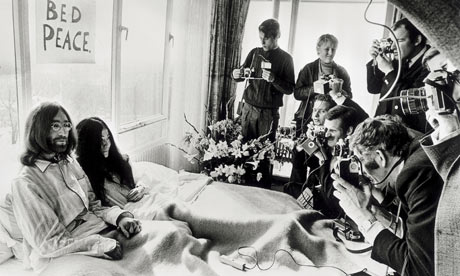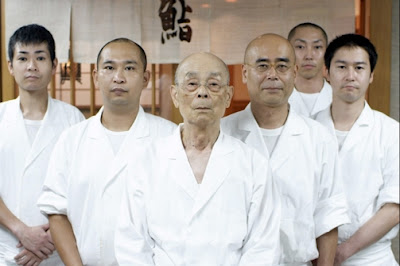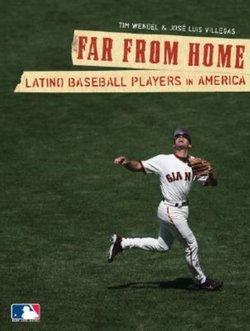 |
John Lenon and Yoko Ono making Bed Peace. The
documentary in which this protest is featured is memorable.
Also, "All we're saying, is give peace a chance" will get
stuck in your head for days. I suppose there are worse
tunes to be hummin'. |
Jiro Dreams of Sushi is a tightly wound, buttoned-up documentary about a man named Jiro and his pursuit of perfect sushi. Roy Tin Cup McAvoy would counsel as EU politicians amidst austerity measures might-- "perfection is unattainable." It's also a war movie. Baseball, the longwinded, robust documentary from Ken Burns is divided into 11 parts (innings). I'm both embarrassed and thrilled by how much time I've spent watching this documentary and loving Garrison Keillor narration. Most of the 25 hours hinge on war, as does baseball. Restrepo was filmed in "the most dangerous place in the world," Afghanistan. It follows a group of Marines into this place--nothing else though, just war.
 |
New French President, Francoise Hollande, representing
the Socialist party's return to power, meets with small business
owners in Tulle market. Complete with an austere agenda
and a name that American's are sure to hate, he'll be
leaning on Tin Cup style wisdom. |
Jiro, Baseball, and Restrepo are war movies. The extent to which dosages of war are apporitioned in each varies. However, be it on a pristine, just wiped down, sushi [home] plate or a machine gun turret aimed at shadows, the impact of heaping servings of war is astounding. Not awesome, just astounding. And that's the point.
Jiro made its way to movie theaters and out of the mushy indie doc world because it is minimalist, shouts out to genre top dogs, enhances thoughts with thinker's music, and insinuates several really good questions sans behind-camera-narration. Insinuated question one: what is a good life? See. Good question. Jiro knows the answer and by way of convictions and nearly flawless attendance, PW style, he makes you wonder if he's on to something. That's why there is a documentary about him. Rick Warren claims to know the answer as well. That's why he is overweight, a millionaire, pro-war and still a pastor. It's a compelling story, this one.
 |
Japan's snowboard team before the olympics. Kokubo
center, was fined for not being Jiro enough--he didn't
tie his tie correctly. Notably, Kokubo refuses to alter
his series of tricks in competitions though he rarely wins.
He claims that his tricks are cooler than Shawn White's
so he "stays the course." |
 |
Jiro and his staff. His two sons immediately behind him.
His younger son was forced to open his own restaurant
while his oldest son (third from right is Jiro's apprentice;
he is in his 50s. |
Jiro has pursued perfect sushi for 83 years. He works harder than every other sushi chef in the world. He demands complete surrender of himself and his employees. His restaurant is open six days out of seven. It is the only sushi restaurant in the world to receive three Michelin Stars. He is very Japanese, as the stereotypes would have us believe, and has not wavered but for two notable happenings and potentially, for a third. Happening number one: smoking almost killed him, had to spend some time in the hospital. Happening (potentially) number two: there is not going to be any fishes because we have over fished our oceans. The "California Roll" is supposedly the culprit. Happening number three: there was a great war.
 |
Ken Burns has 'an effect' named for him. His documentaries
are long and encompassing--a throwback to a generation
gone-by. His throwing form should not be used to
measure or pass judgement on his abilities to piece
together a throw-back documentary. |
In this war, Japan attacked the United States,
contributed to genocide, had a culture altering bomb dropped on their homeland. Whoa. From sushi to atomic bombs. Insinuated question two: what does a good life mean for one that works diligently in a post WWII Japan? (This is also a really good question.) Were this movie able to sidestep historical realities it would be less interesting. Many work diligently in utopia. We work diligently, though, in a society that for some terrible reasons, goes to war. One can't stop wondering, after seeing this really good documentary, firstly, what the hell has Jiro's wife been up to all this time? Secondly, how much of a response to WWII is the work ethic of Japan's 'Greatest Generation'? In another way, what's next for Japanese culture? Jiro dedication mashed-up with post-Nirvana expectations could be interesting. For real, check out their snowboard team and be inspired. Most of all though, keep your eye on David Gelb. This anti-war documentary has mostl likely catapulted him into Weinstein's office/palace and onto Red carpets.
 |
In the last 20 years there has been a 218
percent increase in latino players in MLB. |
Baseball is a little more overt than Jiro. It's a war movie and does little to hide the fact. What tips the viewer off to Ken Burn's Mel Gibsonesque aspirations is the trifurcated storyboard. Baseball before War and baseball after War and then baseball before War and then baseball after War and then baseball before War and then baseball after War. Luckily, for Ken Burn's sake, though he does get off on being exhaustive, we've managed to snuggle baseball close enough to corporate television contracts to keep it from going anywhere--come hell or high water. Though, I'm not sure MLB, ESPN, FOX and Obama are prepared for what would happen to professional baseball if a Hispanic/Latin country goes to war. Ken Burn's would have to leg-out this doc into a twelfth inning, I'd imagine.
 |
A catcher/soldier trying-out for the Army
baseball team and embodying two things
that our nation does really well--war and baseball. |
The point is that our nation loves two things: baseball and war. Burns, having spent most of his life with librarian archive specialists, weaves the two together with haggard footage of Babe Ruth "touching them all" and soft overtones of rich white men's quotes about the necessity of each, baseball and war. Leaving the Ken Burn's Effect aside, the viewer is left with a sour taste followed promptly be sweet nostalgia--Sour Patch Kid-like. "Ah, the days when baseball players, men paid little to make much for those at the top, were forced to go to war. That's when we knew what this country stood for." The identity inducing elements of America's pastime, war and baseball, in this documentary, opined on by Ken Burns, put this movie on the
McArthy must-watch list.
 |
A member of Second Platoon meeting with citizens of
the most dangerous place on earth, a valley in Afghanistan
home to Taliban (Rebels, Insurgents, Terrorists and
Monsters). Some of the most striking scenes in the
movie show the weekly meetings of Second Platoon's
leadership with village elders. The culture clash could
only be enhanced if the Sergeant were to hand out
California Rolls before explaining the rules of baseball. |
Restrepo does nothing to hide from war genre epics. Complete with bullets, tattoos, hero sentiments, and a lack of remorse, Sebastian Junger and Tim Hetherington put the anti-war movement in the throes of real war. They bravely dig-in with the Second Platoon in one of the most crucial valleys in Afghanistan as the soldiers labor and shoot and labor and shoot. One of the most gripping and unsettling war movies ever made. In the first place, it makes one question Ken Burn's platform--all cozy and acoustically perfect. In the second place, it does well to usher forward the most pertinent question we should be asking, "What the hell are we doing there?!?!" I wonder if Jiro asked a similar question. Especially if he was stationed on Iwo Jima. Did he dream of sushi on that god forsaken island like the Second Platoon dreamed of cheeseburgers in that godforsaken valley? Maybe. Either way, Junger and Hetherington do not let up on a mission set in motion by anti-war documentarians before them. David Gelb, Ken Burns, Sebastian Junger and Tim Hetherington adhere to one theme: war dominates, sadly.









No comments:
Post a Comment